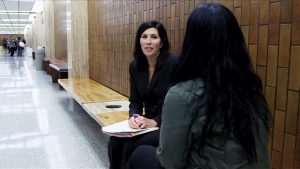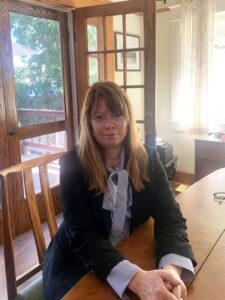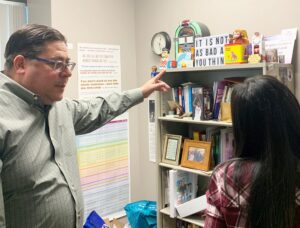
When Bill Tarkanian, Director of Program Development for the Los Angeles Centers for Alcohol and Drug Abuse (L.A. CADA), a behavioral health treatment provider, sat down with a few deputy public defenders who expressed interest in starting a drug court program dedicated to the LGBTQ population, he thought, “What wonderful people, but it’s never gonna happen.”
He didn’t know Deputy Public Defenders Nancy Chand, Melissa Mertens and Meredith Rudhman well enough yet.
This month, the LGBTQ-Plus branch of the Collaborative Court has officially launched at the Clara Shortridge Foltz Criminal Justice Center downtown LA with Superior Court Judge Michael Tynan presiding.
Chand, who was the leading creator of the Second Chance Women’s Re-entry Court program, perhaps the only reentry court in the nation for women facing a state prison sentence, worked with several agencies after she saw the need.
“It can be difficult for someone in the LGBTQ community to participate in treatment when the majority of people in the program are not a part of their own community,” Chand said. “Substance Use Disorder recovery requires the participant to share honestly about themselves. Unfortunately, the environment in some treatment programs is such that members of the LGBTQ community do not feel safe to be themselves.”
In a traditional drug treatment program, a transgender woman, for example may be included in male groups and would have to adapt to a mostly heterosexual male culture.
“That’s hard when the whole point of Substance Use Disorder treatment is to be able to get to the underlying reasons why the person became addicted,” Chand said. “That can include an abusive childhood, other trauma, as well as having to hide your gender identity or sexual orientation.”
Culturally Appropriate Services
This new Collaborative Court has branched out to partner with L.A. CADA, which operates a full continuum of care (residential, intensive outpatient, outpatient treatment programs) including two unique Recovery Bridge Housing programs, the Art House, in Pasadena, and the Start House, in Altadena — established for people with marginalized sex, sexual orientation, gender identity status, and LGBT-identified people seeking recovery from substance misuse.

“Not all treatment facilities are the same,” Tarkanian said. “Some pride themselves on having culturally and linguistically appropriate services and L.A. CADA is one of them.”
L.A. CADA creates opportunities for members of marginalized populations to be successful in treatment because it caters services to better address their unique needs, he said, adding, “still within the framework of a drug court or diversion court.”
Tarkanian knew it would be difficult to get all the players on the same page — PDs, DAs, Probation, a judge — to serve this specific population.
On the day the new branch of the Community Collaborative Court started, Tarkanian looked around the courtroom. “Can you imagine all of these pieces working in concert to change people’s lives? That’s what this system should be. This is not just an outlier treatment program bucking the system. It’s like a symphony of all these important players participating and bringing about positive change to the system.”
Tarkanian knows from personal experience that traditional treatment programs can be detrimental for members of LGBTQ community. Years ago, he was a criminal defense attorney in private practice with his own drug and alcohol abuse problem. When high on drugs, he committed acts he would never do sober, he said. His drug abuse culminated with arrests for possession, petty theft, then commercial burglary.
Facing a prison sentence, Superior Court Judge Terry Lee Smerling gave Tarkanian one last chance.
“Judge Smerling recognized part of my problem was that I suffered from internalized homophobia,” Tarkanian said. “I was a gay man abusing drugs. Instead of sentencing me to prison, he gave me one last opportunity. Six months in residential treatment and six months intensive outpatient treatment.”

The private treatment and sober living programs Tarkanian participated in were LBGTQ-friendly and that made all the difference, he said. It worked for him and he was able to turn his life around. Once sober, he found his calling in helping people recover from addiction, focusing on marginalized underserved communities.
Reducing Recidivism
About four years ago, L.A. CADA contracted with the LA County Department of Correctional Health Services to provide an in-custody drug treatment program at Men’s Central Jail. He heard the horror stories from gay and transgender inmates who tried traditional drug treatment programs that showed bias against their authentic selves. One transwoman recalled her treatment program staff telling her that genders were assigned at birth. When the treatment is unsuccessful and the person ends up back in custody, they refuse a treatment program, saying it doesn’t work for them.
Knowing that a safe landing was paramount to reducing recidivism for this population, L.A. CADA established the Art and Start Houses. Those facilities are staffed by several LGBTQ community members, many of whom have successfully completed the in-custody treatment program.
“They are leading by example,” Tarkanian said. “They are a beacon of hope and inspiration for a population that never before did well in treatment.”
The LGBTQ-Plus Court is a dream come true, he said. The Plus includes other vulnerable individuals who may require specific services outside of traditional drug courts.
“The treatment provider for this court’s philosophy is that we’re all human beings and need culturally appropriate services,” Chand said. “By providing services better tailored to our clients’ experiences and needs, the participants are in an environment where they are able to embrace the shared goals of healing themselves while being exposed to and appreciating the differences among them. It’s a little society that’s showing the rest of us the way we should be treating each other.”
